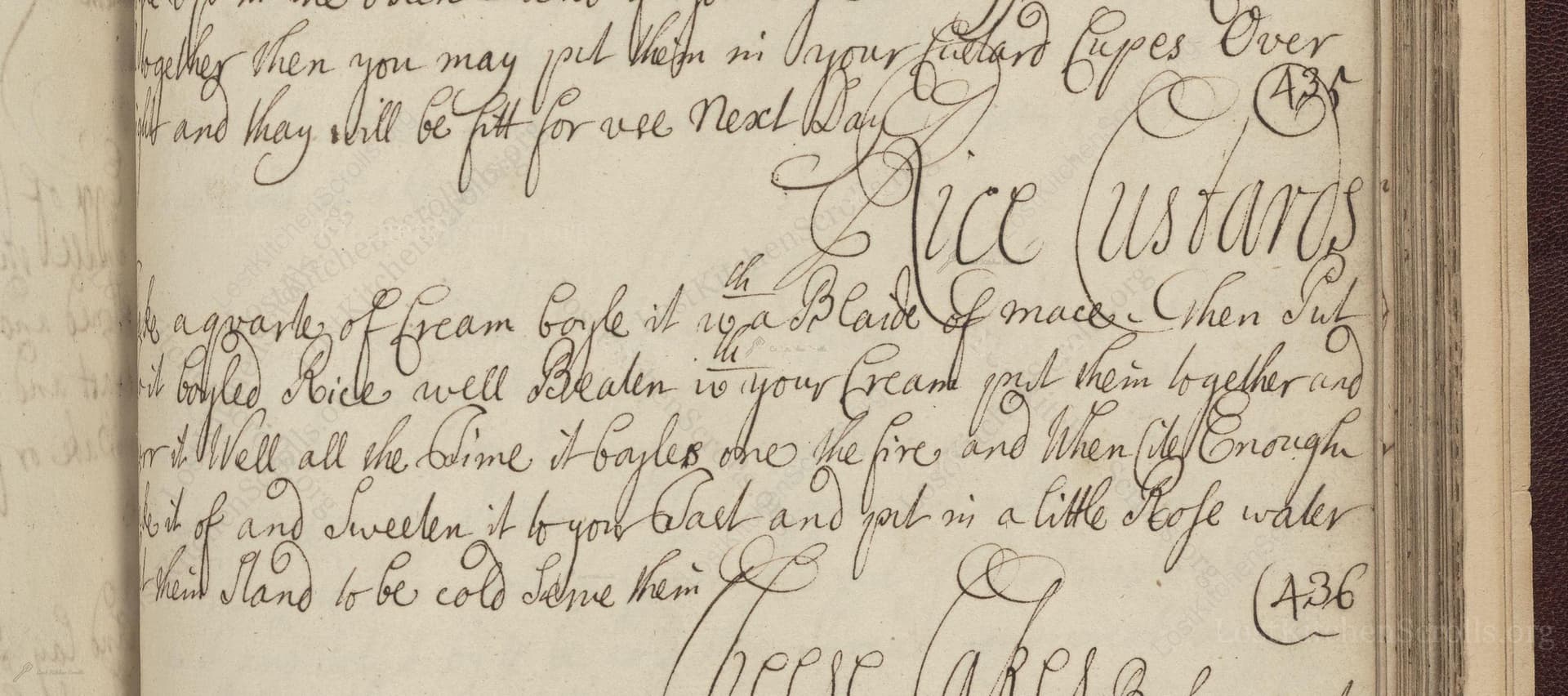Rice Custards
From the treasured pages of Cookery book of Lettis Vesey
Written by Lettis Vesey

Rice Custards
"Take a quarte of Cream boyle it with a Blade of mace then take halfe a pound of Rice well Beaten in your Cream put them together and stirr it Well all the time it boyles one the fire and when it is boyled Enough take it of and Sweeten it to your tast and put in a little Roose water then Stand to be cold Serve them"
Note on the Original Text
The recipe is written in the direct, conversational style of early 18th-century manuscript cookery—no strict quantities or timings, as was common before standardization. Words like 'quarte' mean quart, 'boyle' is boil, and 'roose water' is rosewater. The spelling reflects contemporary practices, emphasizing succinct instructions with the expectation of basic kitchen knowledge. The command to keep stirring and check for 'boyled Enough' leaves the cook to interpret readiness, typical of historical recipe writing.

Title
Cookery book of Lettis Vesey (1725)
You can also click the book image above to peruse the original tome
Writer
Lettis Vesey
Era
1725
Publisher
Unknown
Background
Step into the culinary world of the early 18th century with Lettis Vesey’s delightful collection. This historical cookbook offers a charming glimpse into the recipes, flavors, and kitchen wisdom of ca. 1725, blending elegance with hearty tradition for curious cooks and gastronomes alike.
Kindly made available by
Folger Shakespeare Library
This recipe hails from early 18th-century England, specifically from the hand of Lettis Vesey, flourishing around 1725. Such rice-based custards were fashionable among the gentry, showcasing imported ingredients like rice and exotic flavorings such as rosewater—indicating wealth and worldliness. Cream-based puddings and custards were common for dessert courses or as nourishing dishes for convalescents. The served cold aspect hints at service in refined households, sometimes poured into decorative molds.

For this recipe, a heavy-bottomed pot for boiling the cream, a wooden spoon (or a long-handled spatula) for constant stirring, and a mortar and pestle for beating (grinding) the rice. A fine sieve may also be employed. For serving, porcelain or pewter dishes would be used, possibly with decorative molds for a final flourish.
Prep Time
10 mins
Cook Time
25 mins
Servings
6
We've done our best to adapt this historical recipe for modern kitchens, but some details may still need refinement. We warmly welcome feedback from fellow cooks and culinary historians — your insights support the entire community!
Ingredients
- 1 quart heavy cream
- 1 blade mace (or 1/2 teaspoon ground mace as substitute)
- 8 ounces white rice (short-grain preferred)
- 1/2 cup granulated sugar (or to taste)
- 1 tablespoon rosewater
Instructions
- Begin by heating 1 quart of heavy cream with a single blade of mace in a saucepan, bringing it gently to a simmer.
- Meanwhile, weigh out 8 ounces of rice and grind or process it into a coarse meal (not flour, more like very fine grits).
- Gradually whisk the ground rice into the hot cream, stirring constantly over medium-low heat to prevent clumping or sticking.
- Continue stirring and cooking until the mixture thickens well, about 20-30 minutes; the rice should be completely soft and the custard creamy and cohesive.
- Remove from the heat.
- Sweeten to taste with granulated sugar—start with about 1/2 cup, adjusting as you prefer.
- Stir in a tablespoon of rosewater for delicate floral notes.
- Transfer the mixture to serving dishes or molds, let cool to room temperature, then chill.
- Serve cold as elegant, set custards.
Estimated Calories
420 per serving
Cooking Estimates
It takes about 10 minutes to weigh and grind the rice, and prepare the cream and mace. Then, you cook the mixture for about 25 minutes until it thickens. This recipe serves 6, with each serving around 420 calories.
As noted above, we have made our best effort to translate and adapt this historical recipe for modern kitchens, taking into account ingredients nowadays, cooking techniques, measurements, and so on. However, historical recipes often contain assumptions that require interpretation.
We'd love for anyone to help improve these adaptations. Community contributions are highly welcome. If you have suggestions, corrections, or cooking tips based on your experience with this recipe, please share them below.
Join the Discussion
Rate This Recipe
Dietary Preference
Culinary Technique
Occasions

Den Bockfisch In Einer Fleisch Suppen Zu Kochen
This recipe hails from a German manuscript cookbook compiled in 1696, a time whe...

Die Grieß Nudlen Zumachen
This recipe comes from a rather mysterious manuscript cookbook, penned anonymous...

Ein Boudain
This recipe comes from an anonymous German-language manuscript cookbook from 169...

Ein Gesaltzen Citroni
This recipe, dating from 1696, comes from an extensive anonymous German cookbook...
Browse our complete collection of time-honored recipes



